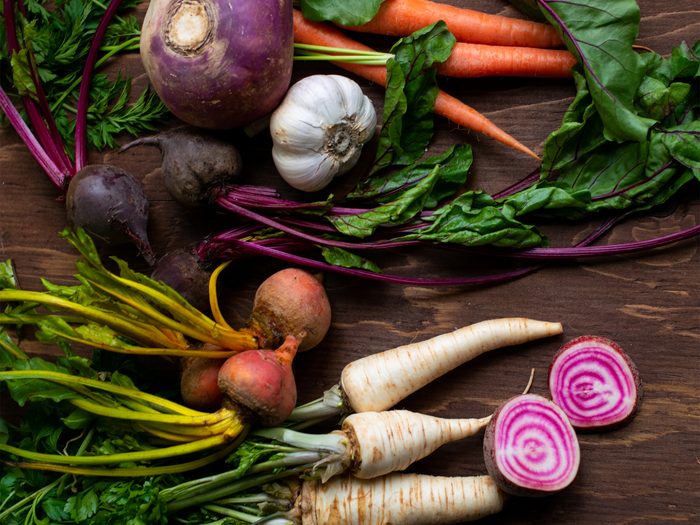Why Roasted Root Veggies Are a Winter Nutrition Win

Here are four reasons to eat them more often.
Calling all meal-prep procrastinators! Roasted root vegetables offer a low-effort, high-reward dinner solution with endless possibilities. Here’s why they’ll be your winter cooking hero.
You’ll eat the rainbow
Variety isn’t just the spice of life—it’s also good for you, especially when vegetables are involved. For example, orange-coloured veg like carrots, squash and sweet potatoes are good sources of vitamins A and C, which both contribute to immune function. For a mix of nutrients in your meal, pick different-coloured vegetables, making sure to chop them into equal-sized pieces so that everything cooks evenly. When I’m in a hurry, I’ll chop veggies small to speed up cooking, but if I’m getting tired of chopping, I’ll leave my veggies chunky.
You’ll consume more healthy fats
Fats, like cooking oil, not only make the veggies crispy and tasty, they also help your body absorb the fat-soluble vitamins found in these vegetables, like vitamins A, E and K. Picking out a fat or oil to use can be tricky. When roasting at higher temps, choose fats that have a higher smoke point to avoid burning your meal and giving the food an unpleasant scorched, bitter taste. If you’re roasting at very high heat (over 450°F), try refined avocado or safflower oils, which have some of the highest smoke points. Olive oil and sunflower oil is fine up to about 425°F.
Your digestion will improve
Regardless of what raw-food diet trends say, cooking vegetables is good for you. While it’s true that some nutrients dissipate when heated, cooking vegetables helps break down their fibrous cell walls, so your body has to do less work to digest and absorb them. Plus, cooked carrots, spinach, mushrooms, asparagus, cabbage, peppers and tomatoes all supply more of certain antioxidants, such as carotenoids and ferulic acid, to the body than they do when raw.
You’ll have so many options
If you’ve ever been gifted a spice blend set that’s now gathering dust in the cupboard, pull it out for a batch of roast veggies. Spices are a good way to boost flavour, especially if you’re limiting salt intake. Mixes like herbes de Provence, Chinese five spice and za’atar can really breathe new life into your roasted veg.
Stroll down the international aisle for more inspiration: Middle Eastern shawarma spice, for example, is great on roasted carrots, along with olive oil and honey. And don’t be afraid to try blends usually reserved for meats, like peri-peri and Jamaican jerk seasoning.
Some of my favourite spices to add (beyond salt and pepper) are chili powder, ground cumin, coriander, smoked paprika and turmeric. Or, use curry powder or garam masala, which include some of these spices and pair well with winter root vegetables.
Dress up your roast veg to give them even more flavour. In the winter, when fresh vegetables look less appealing, these upgrades make everything more appetizing.
To add freshness, use leafy herbs, such as parsley, dill and basil, to make sauces like chimichurri, pesto or salsa verde. For a creamy flavour, add crumbled feta, Greek yogurt, diced avocado, tahini or miso. Looking for some crunch? Top your veg with toasted nuts and seeds, pickled onions, pomegranates or chili crisp. For sweetness, try hot honey. And to add some tang, opt for vinegars, a squeeze of fresh lemon or lime or a splash of orange juice.
Some of my go-to combinations include roasted squash drizzled with tahini and topped with pickled onions; carrots, dolloped with Greek yogurt and a sprinkling of toasted nuts and dill; and eggplant brushed with miso and hot honey, garnished with sliced green onion.
With the right cooking technique and some well-placed seasonings, root vegetables will soon be the most colourful, nutritious dish on your table this winter.
Laura Jeha is a registered dietitian, nutrition counselor and recipe developer. Find out more at ahealthyappetite.ca.
Next: This Recipe for Spice Roasted Root Veggies Is Our New Favourite Winter Dish




